
Mexico does not offer direct citizenship by investment, but you can qualify for a Mexican passport by first investing in property or business, getting residency, and then naturalizing after 5 years. Here's how it works, plus how to skip consulate visits and typical pitfalls.
If you're a U.S. citizen exploring ways to secure dual nationality, live part-time in Mexico, or protect your family's future, this article breaks down how investment-based residency can eventually lead to Mexican citizenship. Whether you're looking for financial freedom, a second passport, or legal security across borders, this is your roadmap.
We've helped thousands of clients, many rejected by the consulate or misinformed by online articles, secure Mexican nationality legally and remotely. You won't need to travel, speak Spanish, or deal with bureaucracy. We handle everything for you.
Want the full breakdown? Keep reading. Below, we'll walk you through every step, show how it differs based on your situation, and help you avoid the most frequent mistakes.
The Legal Path to Mexican Citizenship Through Investment
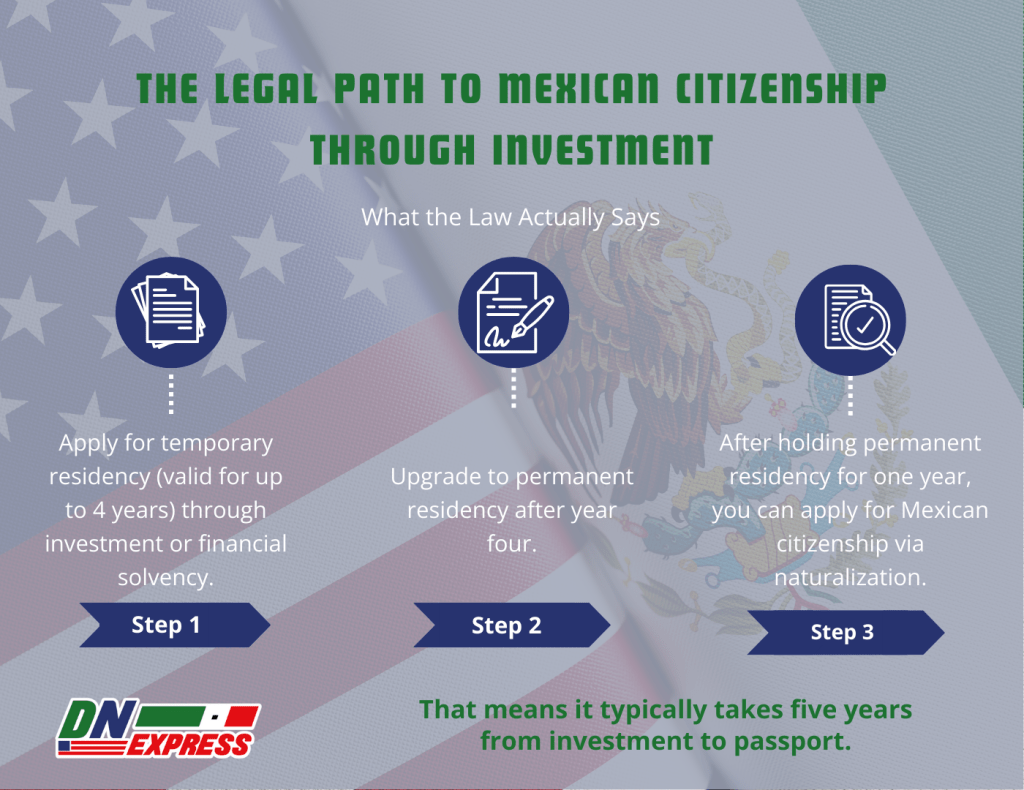
What the Law Actually Says
Despite what some marketing-heavy websites might suggest, Mexico does not offer a direct “citizenship by investment” program like Malta, Turkey, or St. Kitts. There's no fast-track to a Mexican passport simply by buying real estate or making a financial deposit.
Instead, Mexico offers a residency-by-investment path, which, when combined with time, presence in the country, and legal compliance under Mexican Immigration Law, can lead to naturalization and citizenship.
Here's how the process works:
Paso 1: Apply for temporary residency (valid for up to 4 years) through investment or financial solvency.
Step 2: Upgrade to permanent residency after year four.
Step 3: After holding permanent residency for one year, you can apply for Mexican citizenship via naturalization.
That means it typically takes five years from investment to passport. Faster if you're married to a Mexican citizen or have Mexican children.
Investment-Based Residency Options
There are three legal routes to qualify for temporary residency based on economic criteria:
-
Real Estate Investment
Own property in Mexico valued at around $220,000 USD. This must be in your name, free of liens or debt, and properly documented through official deeds or valuations.
-
Business Investment
Invest at least $110,000 USD in a Mexican corporation or private business, with proof of economic activity and job creation for at least 3 people according to Mexico's Foreign Investment Law.
-
Financial Solvency
Prove economic solvency through:
A monthly income of ~$3,275 USD for the past 6–12 months
Or savings of ~$73,000 USD in a liquid account over the last year
Some Mexican consulates apply slightly different financial thresholds. Our service helps you select the consulate with the most favorable review process for your situation.
Required Documents
To apply for temporary residency, you'll need:
- A valid passport (minimum 6-month validity)
- Proof of investment or solvency (property deeds, business shares, bank statements, employment letters)
- Clean criminal record from your country of origin
- Health certificate (in some cases) showing you are free from contagious diseases
- Passport-sized photos and a completed Mexican residency application form
Worries
Can U.S. citizens invest in Mexico?
Yes. Foreigners can invest in real estate, business, or qualify through passive income. Legal status is required for long-term stay or naturalization.
Can I get residency if I buy property in Mexico?
Only if the property meets specific valuation thresholds and you also meet supporting financial requirements.
What is the cheapest way to get Mexican citizenship?
If you qualify by descent (parent or grandparent born in Mexico), you can often skip residency and investment entirely. Otherwise, financial solvency based on income or savings is often the least expensive legal route.
What Most Sites Don't Answer
Most guides stop at the basics. But if you're serious about securing Mexican citizenship through investment or descent, you're probably asking more nuanced questions. These are the genuine concerns we hear from clients every day, and the answers matter.
Do I have to live in Mexico the full five years to get citizenship?
Generally, yes. To naturalize, the law requires five years of legal residency with minimal absences. But there's flexibility depending on your situation.
If you have a Mexican spouse or child, you may qualify in two years. And if your presence has been inconsistent, our service can help argue exceptions, especially for remote workers or dual-residents.
Can I qualify through crypto income?
Yes. If your crypto holdings are legally documented and converted into fiat assets (like savings or stable passive income), you can use them to prove financial solvency.
We've helped clients who use Coinbase, Fidelity, or Binance statements, alongside tax returns, to qualify.
My parent is deceased. Can I still apply by descent?
Absolutely. Even if your Mexican parent is no longer living, you can still claim citizenship by descent.
We'll help you file a late registration for them in Mexico first, then file your own nationality claim. It's additional paperwork, but it's 100% legal and standard for second-generation U.S.-born applicants.
Will I lose my U.S. passport if I naturalize in Mexico?
No. Both the United States and Mexico allow dual citizenship. You won't lose any rights or legal status in the U.S. by becoming a Mexican citizen.
In fact, many of our clients carry two passports and use whichever one gives them the best entry rights. Learn more about how dual citizenship affects your U.S. passport.
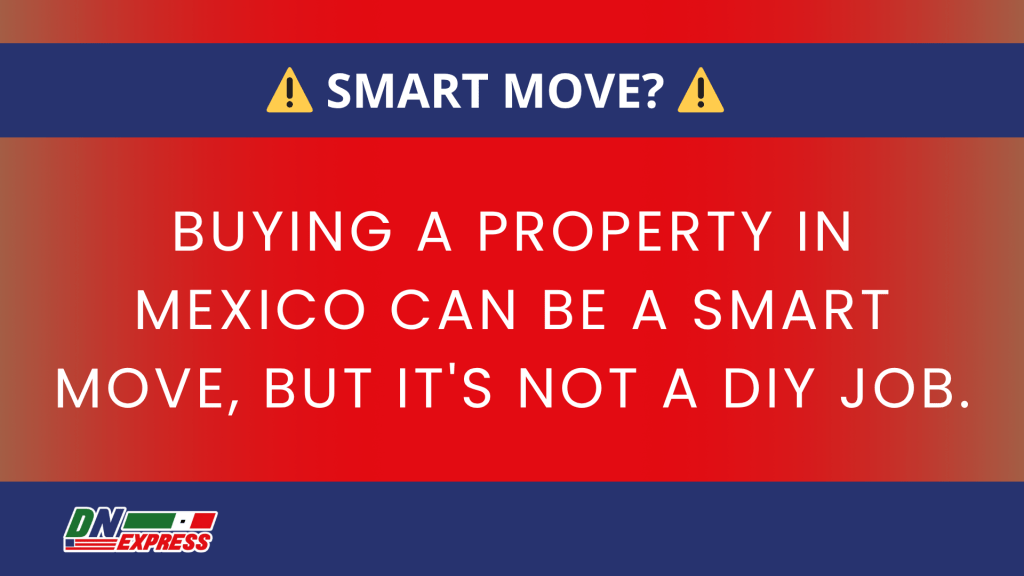
Deeper View, Pathway to Passport: Step by Step
Whether you're investing in real estate, launching a business, or proving financial solvency, the journey to Mexican citizenship follows a predictable, but tightly regulated, timeline. Here's how it works:
Step-by-Step Process Overview
- Step 1: Choose your investment path Decide whether you'll qualify through:
- Property ownership (~$220,000 USD in Mexico)
- Business investment (~$110,000 USD + job creation)
- Financial solvency ($3,275/month income or $73,000 in savings)
- Not sure which fits you best? Our service offers a free case review to identify your strongest option.
- Step 2: Apply for temporary residency We prepare and submit your residency paperwork with your financial documents, background checks, and application forms. No consulate appointments. No guesswork.
- Step 3: Maintain your residency Temporary residency must be renewed annually for four years. During this time, you'll need to maintain valid immigration status and stay legally compliant.
- Some clients qualify to skip renewals and go straight to permanent residency after 2 years, depending on their situation.
- Step 4: Upgrade to permanent residency After four years (or sooner, in some cases), you become eligible for permanent residency, which comes with no expiration and greater freedom to travel or live outside Mexico.
- Step 5: Apply for naturalization After one year of holding permanent residency (total 5 years of residency), you can apply for Mexican citizenship. This includes a language and cultural test, proof of integration, and physical presence requirements.
Our service helps clients prepare for their naturalization interview and test, or qualifies them under exceptions that reduce the timeline.
Bonus: For Those With Mexican Ties
If your parent or grandparent was born in Mexico, you may be able to skip the investment and residency route entirely.
We verify your eligibility
We retrieve your family's documents
We file your application directly with the Mexican Civil Registry
No need to live in Mexico. No Spanish fluency required. And in many cases, no travel at all.
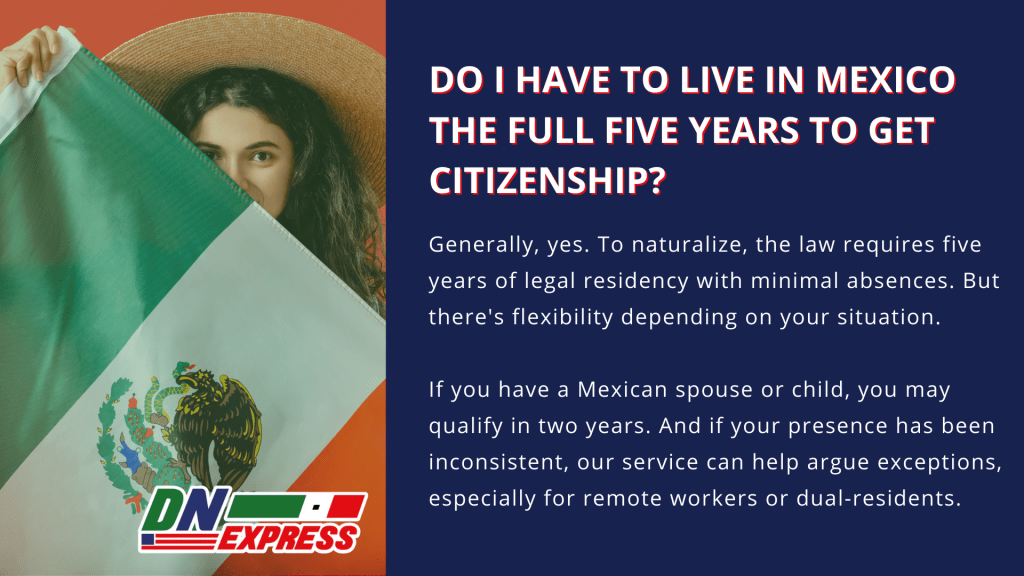
Frequent Worries Solved
We've spoken to thousands of clients across the U.S., and no matter where they're from, California, Texas, Chicago, or Florida, the same fears come up. If you've been putting off the process because of one of these concerns, here's what you need to know:
“I don't speak Spanish.”
You don't need to. Our team is fully bilingual, and we handle the entire process in English and Spanish for you. From your documents to your government filings, we translate and submit everything on your behalf.
“I'm afraid I'll get scammed.”
We get it. There are plenty of unlicensed “gestores” and shady intermediaries out there.
Working with us, your case is reviewed and processed by licensed Mexican attorneys, with service guarantees and written contracts. We've helped over 3,000 clients, many of them referred by family and friends.
“I heard the consulate is impossible to deal with.”
You're absolutely right, and that's why we don't use it. You'll never need to schedule an appointment, wait months for a callback, or deal with an inconsistent consulate ever again. We work directly with Mexican civil and immigration offices.
“Is it safe to share my documents?”
Yes. All of your documents are handled in-house by our legal staff, never outsourced or shared.
Files are encrypted, stored securely, and treated with the same standards we use for our own families.
The Pros & Cons of DIY vs Working With Our Service
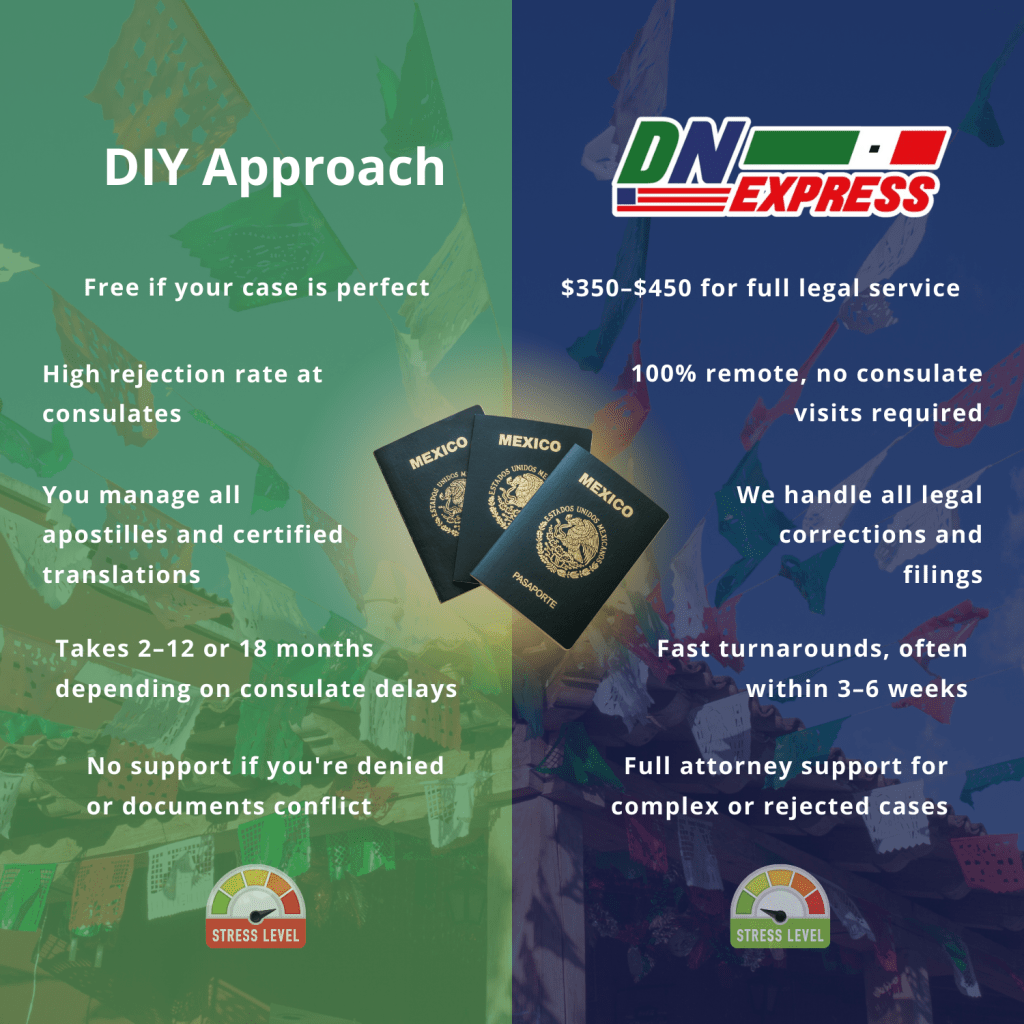
If you're thinking about going it alone, you're not the first. Many of our clients come to us after spending months, or even years, trying the DIY route.
The truth is, this process can be legally complex, emotionally frustrating, and full of bureaucratic landmines.
The Risk of Doing It Alone
Trying to secure Mexican citizenship or residency on your own can lead to:
- Inconsistent consulate requirements: What's accepted at one consulate may be rejected at another.
- Delays due to minor document issues: Name mismatches, apostille errors, or missing accents can stop your case cold.
- No support if your application is denied: You won't have legal recourse or an advocate to fix it.
- High rejection rate for technical errors: A missed letter, wrong date, or untranslated document can invalidate months of work.
- Lost time: DIY cases often take 2–3 times longer due to resubmissions, rejected documents, or chasing updates.
Why Our Service Is Different
We've designed a consulate-free, fully remote process backed by legal knowledge and concrete outcomes:
- All work is done in-house by our licensed Mexican attorneys, no outsourcing or shady middlemen.
- No consulate appointments required, ever. We file everything directly through civil registries and government offices in Mexico.
- We specialize in the hard cases: rejections, mismatched names, double birth certificates, and late parent registrations.
- Transparent pricing with flexible payment plans, plus service guarantees.
- Document recovery in all 32 Mexican states, even if you don't have originals.
- Support via WhatsApp, phone, and email, from both sides of the border.
What's Changing in 2025 (and How to Get Ahead Now)
If you're thinking about waiting another year to start the process, here's why that might cost you, literally.
Mexico is quietly tightening the rules for long-term stays, financial residency, and tax obligations.
Here's what's coming in 2025:
Visa Laws Are Tightening for Remote Workers
Many digital nomads have relied on 180-day tourist visas, re-entering Mexico every few months. That workaround is being phased out.
New regulations will restrict repeat entries and require proof of residency for long-term stays.
New Digital Nomad Rules
Mexico is exploring new residency criteria for remote workers, and it's not all good news. Without official residency status, remote professionals may be denied renewals, flagged at the border, or barred from working legally in the country.
Increased Tax Scrutiny
As part of global transparency efforts, Mexico is expanding financial reporting and tax enforcement. U.S. citizens spending part of the year in Mexico may be required to file locally if they don't have proper residency.
El U.S.–Mexico tax treaty can help, but only if you have your legal status in place.
⚠️ Get Ahead Before the Thresholds Rise
Solvency minimums and document requirements tend to rise every 1–2 years. By starting your process now, you can lock in today's financial criteria, not next year's tougher rules according to current investment climate conditions.
“We've already seen two major changes since 2023. Most people wait until the law changes. Our clients are already approved by then.” Founder, DNExpress
Your Next Steps: How to Get Started With Our Service
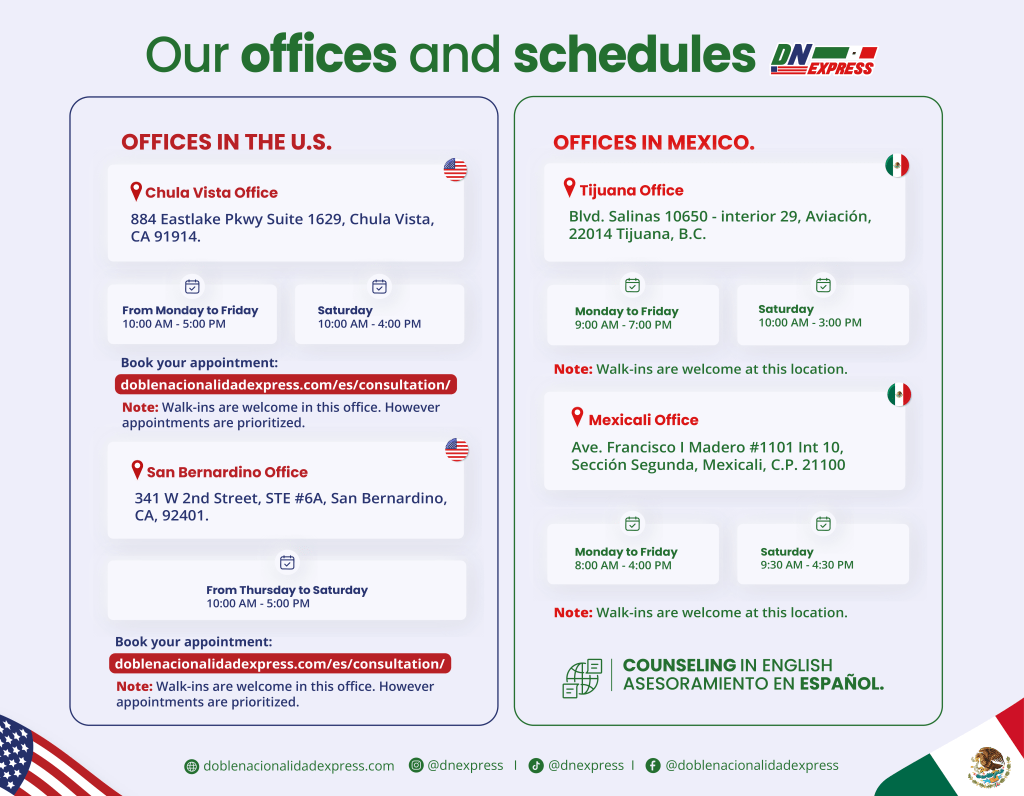
Doble Nacionalidad Express Offices and Schedules.
Ready to move forward? Whether you're still exploring your options or know exactly what you want, we're here to help you take the next step, without the stress, consulate, or confusion.
Whether you're investing in a better future, reclaiming your Mexican heritage, or giving your children the legal rights they deserve, Mexican citizenship is closer than you think.
We believe this process should not be intimidating, expensive, or reserved for the few who “know someone.” We built this service to give families across the U.S., especially those rejected or ignored by the system, a fair shot at legal and cultural recognition.
We've helped over 3,000 clients turn frustration into freedom. Now it's your turn.
Schedule a Free Case Review o Message Us on WhatsApp, no pressure, simply answers.
For additional questions about the process, visit our comprehensive FAQ section.
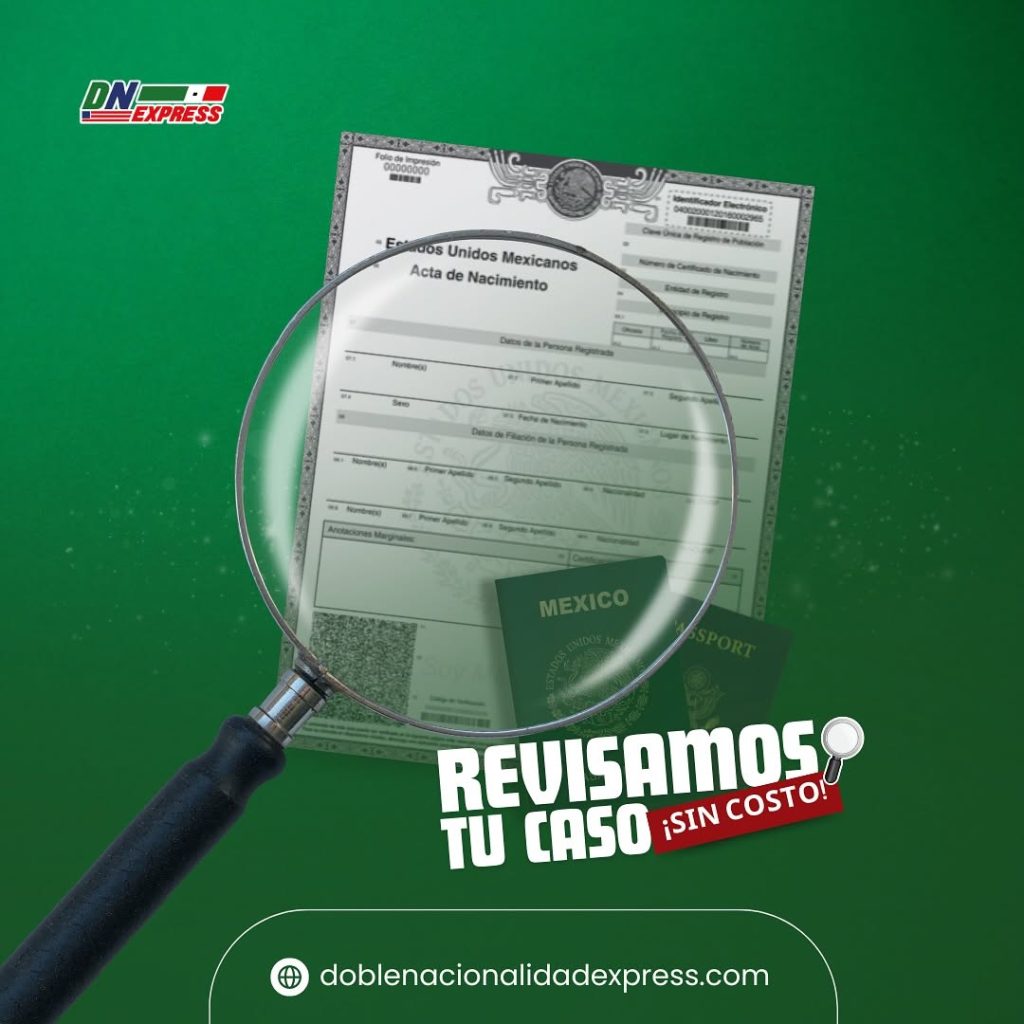
Preguntas frecuentes
Can I get Mexican citizenship by buying property?
No. Property ownership alone does not qualify you for citizenship. It can be used to apply for temporary residency if the property meets valuation requirements, but you still need to go through the 5-year residency and naturalization process.
How long does it take to get Mexican citizenship through investment?
Typically, it takes 5 years: 4 years of temporary residency, followed by 1 year of permanent residency before you can apply for naturalization. In some cases, like marriage to a Mexican citizen, this timeline can be shortened to 2 years.
Do I have to speak Spanish to become a citizen?
Yes, eventually. The naturalization process includes a Spanish language and cultural knowledge test.
However, residency does not require Spanish fluency, and our service helps clients prepare for the citizenship test when the time comes.
Can my children also get citizenship if I invest or naturalize?
Yes. Children can be included in your residency process, and once you're a Mexican citizen, they may be eligible through descent or family reunification, even if they were born in the U.S.
Does Mexico allow dual citizenship with the U.S.?
Yes. Both Mexico and the United States allow dual nationality, so you can legally hold two passports without giving up your rights in either country.



